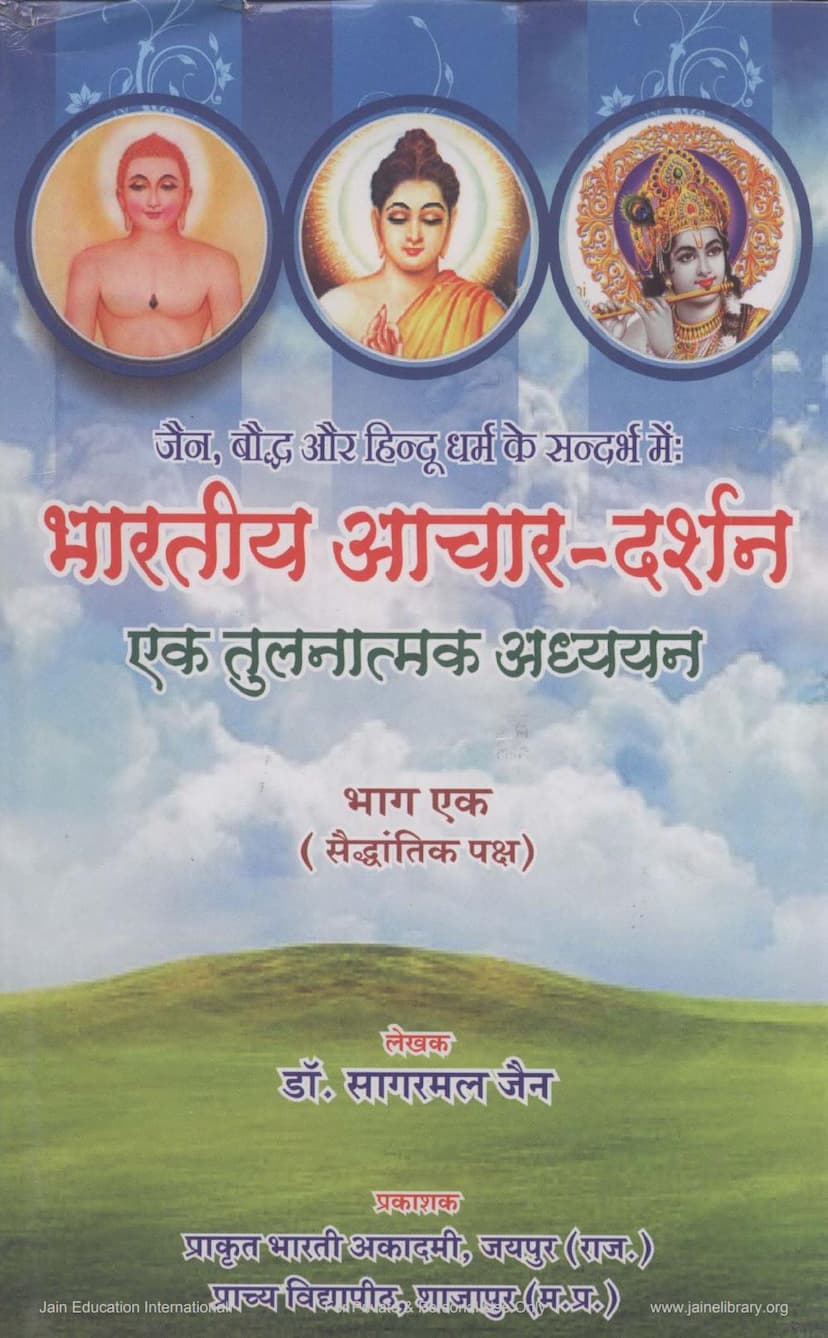Bharatiya Achar Darshan Part 01
Added to library: September 1, 2025

Summary
Here's a comprehensive summary of the Jain text "Bharatiya Achar Darshan Part 01" by Sagarmal Jain, based on the provided pages:
Overview:
This book, "Bharatiya Achar Darshan Part 01," is the first volume of a comparative study of Indian ethical philosophy, focusing on the theoretical aspects. Authored by Dr. Sagarmal Jain and published by Prachya Vidyapith Shajapur and Prakrit Bharti Academy Jaipur, it aims to provide an objective and balanced comparison of the ethical philosophies of Jainism, Buddhism, and Hinduism (represented by the Bhagavad Gita). The book emphasizes the need for such comparative studies in fostering social harmony, tolerance, and coexistence in the present era. It is based on a comprehensive research dissertation written by Dr. Jain approximately 40 years prior to its publication.
Key Themes and Structure:
The book delves into the theoretical foundations of ethical thought across these three major Indian traditions. It systematically analyzes various aspects, attempting to bridge the perceived gaps between them and highlight their underlying similarities. The theoretical part is divided into three main sections:
-
Ethical Principles: This section lays the groundwork for understanding ethical thought in India.
- It begins by defining ethics, its fundamental problems, and the necessity of studying it.
- It explores the nature of Indian ethics, its relationship with Western thought, and addresses critiques from Western thinkers.
- It differentiates between absolute and relative ethics and discusses the concepts of utsarg (general principles) and apavada (exceptions).
- It examines the nature of moral judgment, exploring the role of intent (abhipraya), motive (abhiprerak), resolve (sankalp), and character (charitra) in Jain and Western ethics.
- It analyzes ethical paradigms and principles like purusharth chatushthaya (the four aims of human life) and contrasts Indian and Western value systems.
-
Philosophical Principles: This section delves into the metaphysical and ontological underpinnings of ethical systems.
- It explores the concept of sat (being) from an ethical perspective and compares the metaphysical beliefs of Jainism, Buddhism, and Hinduism.
- It examines the nature of the soul (atma) from an ethical viewpoint, comparing the perspectives on its immortality, free will (purushartha vs. niyativada), and the theory of karma.
- It analyzes the doctrine of karma, its physical and non-physical aspects, its stages, and the concepts of merit (punya) and demerit (paap).
- It discusses the concepts of bondage (bandhan) and liberation (moksha) in relation to ethical conduct, including samvara (restraint) and nirjara (shedding of karma).
- It concludes by examining the relationship between ethics, religion, and the concept of God in these traditions.
-
Psychological Principles: This section focuses on the psychological aspects of ethical conduct.
- It explores the connection between ethics and psychology, discussing motivations, actions, sensory experiences, and the role of psychological factors in ethical decision-making.
- It analyzes the nature of the mind (man), its place in moral life, and the concept of mind control (manonigraha).
- It examines mental dispositions (kashaya and leshya) and their influence on personality and ethical conduct, comparing them with Western psychological concepts.
Key Arguments and Comparisons:
- Need for Comparative Study: The book argues that a comparative study of religions and philosophies is crucial for understanding their actual nature, bridging differences, and fostering social harmony.
- Critique of Western Scholarship: While acknowledging the efforts of Western scholars, the author points out their limitations, including a potential bias towards Christianity and Western thought, and a lack of deep engagement with the original sources compared to Indian scholars.
- Emphasis on Indian Ethics' Strengths: The author highlights the strength of Indian ethical traditions in their focus on inner transformation and holistic development, going beyond mere external actions.
- Comparative Analysis: The book meticulously compares Jain, Buddhist, and Gitaic ethics on various points, including:
- Metaphysics: How different views of reality impact ethical frameworks.
- Karma Theory: Understanding the mechanism of action and consequence.
- Ethics of Conduct: Examining moral principles, virtues, and vows.
- Psychology of Morality: The role of mind, consciousness, and emotions in ethical life.
- The Goal of Life: Comparing the concepts of liberation (moksha), nirvana, and mukti.
- Jain Ethics as Central: While comparative, the book maintains a focus on Jain ethics, using it as a reference point for comparison with Buddhism and the Gita.
- Rejection of Extremes: The author highlights the Indian philosophical tendency to avoid extremes and find a middle path, as exemplified by the Buddha's teachings and the Jain concept of anekanta (non-absolutism).
- Interconnectedness of Theory and Practice: The book stresses that theoretical ethical principles are meaningless without practical application in daily life.
- Critique of Western Critiques: The book addresses and refutes common Western criticisms of Indian traditions, such as charges of being life-negating, overly otherworldly, or ethically deficient.
Significance:
"Bharatiya Achar Darshan Part 01" stands as a significant work for its comprehensive and scholarly approach to comparing major Indian ethical systems. It provides a deep dive into the theoretical frameworks of Jainism, Buddhism, and the Bhagavad Gita, offering valuable insights for scholars, students, and anyone interested in Indian philosophy and ethics. The author's balanced perspective and detailed analysis contribute to a nuanced understanding of these rich traditions.